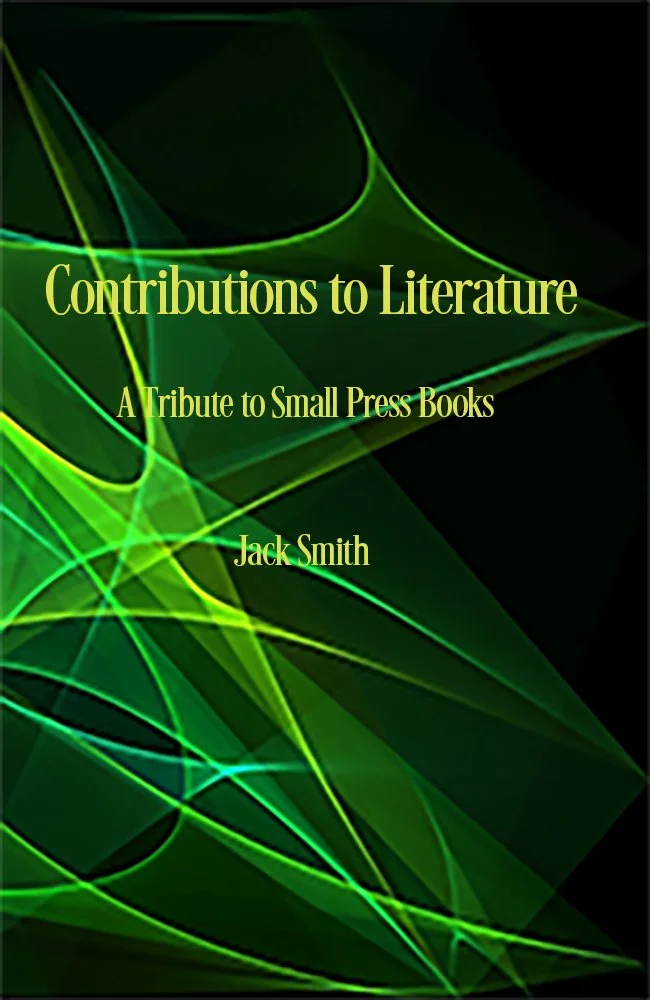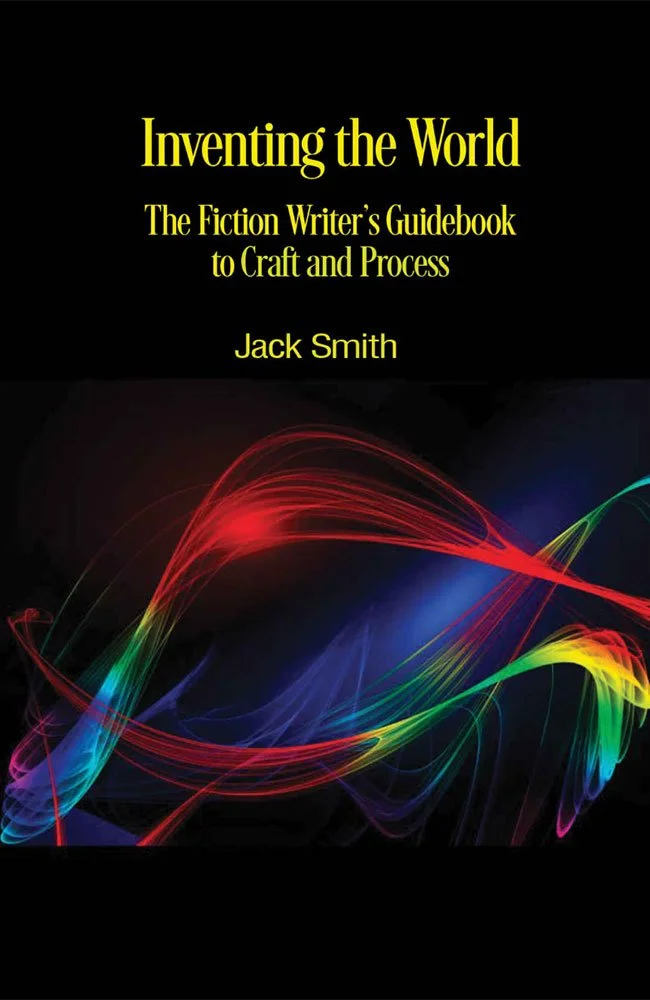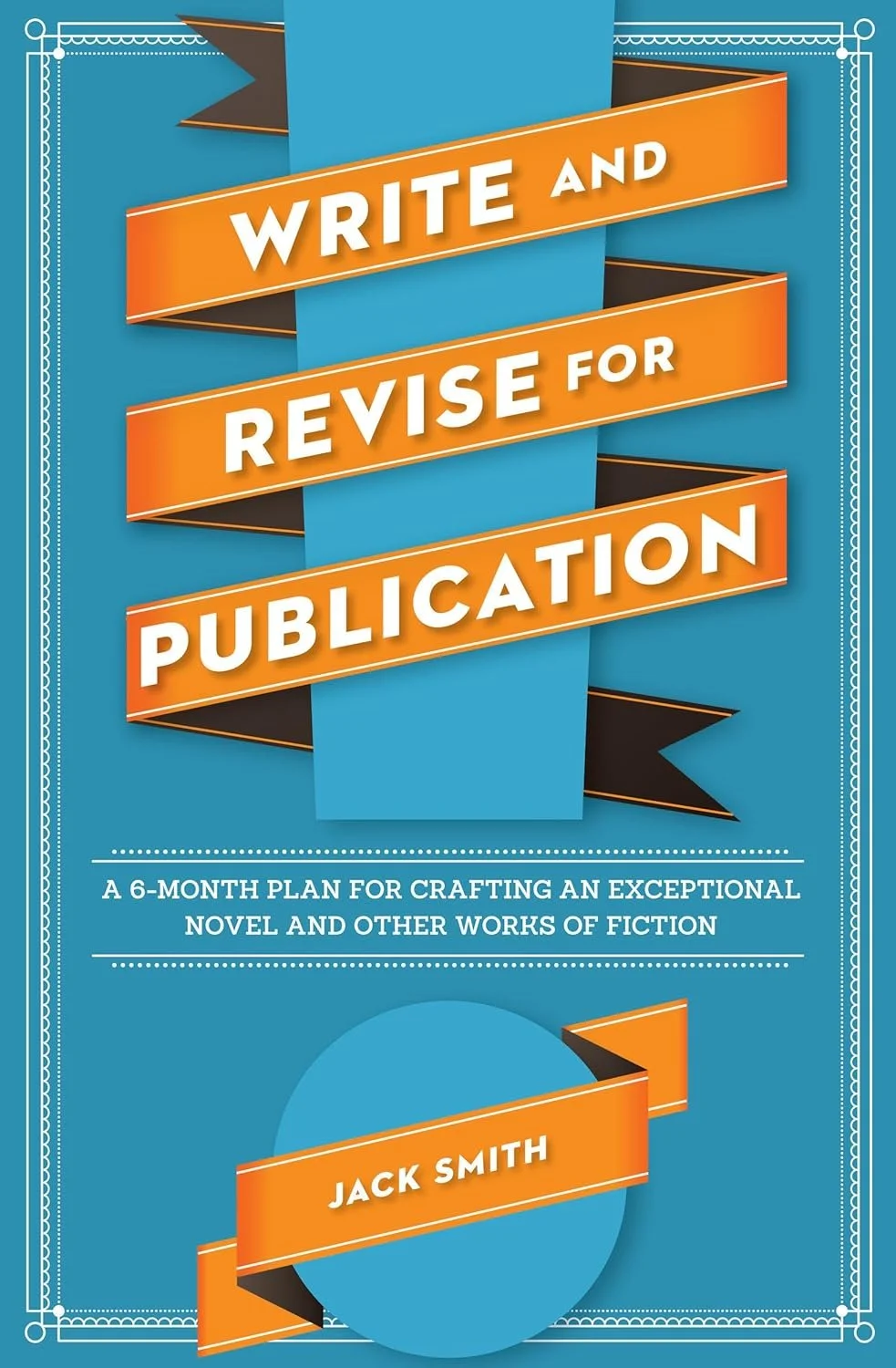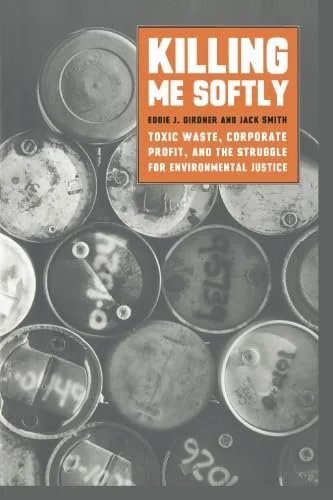Nonfiction Books
Contributions to literature: A TRIBUTE TO SMALL PRESS BOOKS (SERVING HOUSE BOOKS, 2021)
It’s important to authors to get their books reviewed, not just to increase sales but to have them recognized for their contribution to literature. This is especially true for small press books, which might be ignored. The reviews in this collection are of small press books, ones which I believe deserve to be recognized for their contribution to literature.
Reviews
For the past twenty-five years, Jack Smith, prize-winning novelist and founding editor of the nationally recognized literary journal GHLL, has been committed indefatigably to enriching the reader’s understanding by reviewing books of small press authors he has deemed deserving for their contribution to literature. Often lesser known, they have been increasingly shut out by mainstream publishers and a shrinking cultural attention span. As one of the fortunate beneficiaries of Smith’s critically astute and insightful analyses included in this collection, I commend his originality and meticulous account of each work’s merits, enlightened by the universe of renowned writers he has taught and admired throughout his noteworthy career.
--Dennis Must, author of Hush Now, Don’t Explain, Brother Carnival, and Going Dark
In this “Tribute to Small Press Books,” Jack Smith—literary editor, novelist, critic, and philosophy teacher—recommends a league of his own, one in which I am proud to be included. As there was no “great tradition” before the critic F.R. Leavis invented one, so here Smith is drawn to fifteen contemporaries because of his affinities for “the disturbing,” “the dark, absurd, quirky,” “literary realism,” and “memoir and essay,” but more importantly for portrayal of the “human” (meaning our common natures and worth). Of course, he also praises each writer’s social awareness, stylistic range, humor, craft, and key themes. And the collection as a whole proves capacious, moved, and moving.
--DeWitt Henry, author of Endings & Beginnings: Family Essays
Jack Smith is a boundary worker. He labors in and mines the “in” in between. In those spaces between genres and forms, he effortlessly discovers the content that attracts his bright-eyed attention and beyond umami taste while at the same time he deconstructs the category itself of “review” with these new reviews. Coyote, Raven, Anansi, Hermes, Trickster—we need him on those brittle walls, tearing down those walls. Jack Smith’s reviews and essays range and baffle, defamiliarize and rematerialize what has been written, writing, and writing about writing. This little blurb is but a tiny remora greedily attached to this irresistible force, this the basking shark of a book.
--Michael Martone, author of The Complete Writing of Art Smith, The Bird Boy of Fort Wayne, edited by Michael Martone, and The Moon Over Wapakoneta
Inventing the world: THE FICTION WRITER’S GUIDEBOOK TO CRAFT AND PROCESS (SERVING HOUSE BOOKS, 2018)
This book is meant to stimulate thought on the various elements of fiction and on the techniques of writing good fiction and avoiding the bad. Most of the articles in this collection are on the various elements of fiction — character, point of view, structure, theme and idea — and how to handle these well. Also included are some articles on different technical challenges a writer is likely to face, including handling dialogue, writing solid prose, creating voice, and avoiding clichés. Beyond these fundamentals, other articles consider different lengths of fiction, from the shorter to the longer: flash fiction, the short story, and the novella. The book ends with interviews of a number of notable writers, three of them Pulitzer Prize winners, a National Book Award winner, and one a winner of both prestigious awards. Like the articles, these interviews focus on the craft of fiction.
Reviews
A generous collection of essays, interviews, and conversations that does nothing less than throw a light onto the mystery of the creative process, Jack Smith’s Inventing the World is an indispensable guide for any writer at any stage of his or her career. Highly recommended.”
--Anthony Varallo, author of Everyone Was There
The proprietors of the Mom and Pop Shop that produced the Muses were the mash-up of Zeus and Mnemosyne, Memory, a hieros gamos, a marriage that makes the singers sing and allegorically suggests that creation is modulated between highly crafted reason and an inarticulate spontaneous gift. Jack Smith surveys and maps, in this omnibus collection of essays, the surface and depth of that literary creation, confounding and co-finding, the nuts and bolts of craft wedded to art. And he does so while displaying, in his own writing, a rewarding elegant articulation of the conventions that can be explained and the secrets that must be approached on the slant, askance and akimbo. Inventing the World is an exact atlas to this teeming terra incognito of fiction’s textual atolls.
--Michael Martone, author of Michael Martone and Winesburg, Indiana
Jack Smith provides excellent, practical advise on all the important elements of writing fiction, including character development, creating vivid setting and authentic dialogue, using research, drawing readers in with compelling openings. Rather than offering a one-size-fits-all approach, in various interviews and articles Smith allows successful and gifted writers to offer their insights into how they create outstanding fiction. In this book, one finds great advice and food for thought on almost any aspect of writing craft.
--Robert Garner McBrearty, author of Let The Birds Drink in Peace and The Western Lonesome Society
Write and revise for publication: A 6-MONTH PLAN FOR CRAFTING AN EXCEPTIONAL NOVEL AND OTHER WORKS OF FICTION (WRITER’S DIGEST BOOKS, 2013)
Your first draft is a work of imagination, but that doesn't mean it's a work of art--not yet. With Jack Smith's technical and inspirational guidance, you can turn your initial draft into a compelling story brimming with memorable characters and a page-turning plot.
As Jack states inside Write and Revise for Publication, writing is a complex act, one that calls upon all the powers of our creative resources, imagination, and intellect. Top-notch storytelling is not achieved the first time around, nor should it be expected so soon. But it is possible. Through Jack's detailed instruction and precise methods, you will learn the revision techniques and fine-tuning skills needed to create powerful, polished works ready to submit to magazines, agents, and publishers.
Reviews
As inspiring as it is practical...combines great advice, apt examples, and a can-do spirit that will excite and improve any aspiring writer.
--Ron Hansen, author of A Wild Surge of Guilty Passion and The Assassination of Jesse James by the Coward Robert Ford
I believe Jack Smith might have written THE BOOK on writing and revising for publication. Clean, direct, succinct--a book that is full of pure wisdom and truth, but also amazing technical advice.
--Virgil Suarez, author of Latin Jazz, The Cutter, Havana Thursdays, and Welcome to the Oasis
Killing me softly: toxic waste, corporate profit, and the struggle for environmental justice, co-authored with eddie j. girdner, (monthly review press, 2002)
The political economy of toxic waste was summed up by Lawrence Summers—then chief economist at the World Bank, later U.S. Treasury Secretary—in his notorious claim that poor people live in environments that are, from an economic point of view, not sufficiently polluted. The toxic waste industry came to prominence in the United States after 1945. In its ceaseless search for profit, it now routinely endangers the health of people around the worlds and the planet itself.
Girdner and Smith’s Killing Me Softly examines the growth of the toxic waste industry and the economic logic behind its expansion. It gives a hard-hitting account of the damage it has done throughout the United States. It focuses in particular on the struggle of the people of Mercer County, Missouri, against the plans of Amoco Waste-Tech to establish a huge toxic waste landfill in the county. It shows how the persistence of ordinary people in a poor and politically marginalized area could prevail against the predations of corporate power.
Although race and ethnicity play a crucial role in deciding which communities are targeted for toxic waste dumps, Girdner and Smith argue that the critical cleavage within the United States and globally is that of class. The struggle for environmental justice has an important role to play in empowering poor communities and bringing them into a larger movement for social justice.



